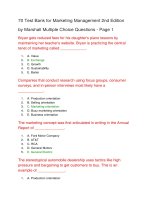70 test bank small business management 7th edition
Bạn đang xem bản rút gọn của tài liệu. Xem và tải ngay bản đầy đủ của tài liệu tại đây (89.57 KB, 17 trang )
Test Bank Small Business Management 7th Edition
30 Test Bank True – False Questions
10 Test Bank Free Text Questions
30 Test Bank Multiple Choice Questions
Which of the following is true about small businesses?
1.
2.
3.
4.
a) They get easy financing resulting in too many choices for funding.
b) Small businesses provide low employee job satisfaction owing to a lower
volume of transactions.
c) They are not subject to burdensome government regulations and paperwork.
d) Inadequate management in small businesses creates problems for small
business owners and entrepreneurs.
Which of the following is a reason for the drastic changes in small
business management trends?
1.
a) Accounting departments become independent of computer support
2.
b) Diverse shift toward less people-related activities
3.
c) Improvements in communications and computer technology
4.
d) Excess supply of managerial talent
Which of the following is the main goal of an incubation program?
1.
a) Provide financial assistance
2.
b) Exempt small businesses from interest on loans
3.
c) Procure equipment
4.
d) Produce businesses that are financially viable and freestanding
A _____ is one that is independently owned and operated and is not
dominant in its field of operation.
1.
a) monopolistic organization
2.
b) public enterprise
3.
c) close corporation
4.
d) small business
_____ is reducing the number of employees to increase efficiency.
1.
a) Freezing
2.
b) Rightsizing
3.
c) Procuring
4.
d) Resourcing
Which of the following best describes one of the contributions of small
businesses?
1.
2.
a) They are sources of new ideas or services that larger businesses may be
unable to provide.
b) They provide large capital gains to the owners.
3.
c) Their products and services are sold at prices that are lower than large
businesses’ prices.
4.
d) They provide economies of scale that large businesses cannot match.
Which of the following is true about the typical growth pattern of a small
business?
1.
a) Owners do not need to give managers a financial interest in the business to
hold them.
2.
b) The length of service of professional managers (as opposed to ownermanagers) in small businesses tends to be relatively long.
3.
c) Owners typically hire professional managers as soon as they start their
business.
4.
d) Professional managers who work in small companies move from one company
to another as they progress upward in rank and earnings.
Which of the following is true about small businesses?
1.
a) The manager usually owns the business.
2.
3.
4.
b) The area of operations is not necessarily local, although the market is primarily
local.
c) Capital is supplied and ownership is held by a large number of individuals.
d) In the European Union (EU), more than 70 percent of the workforce is
employed in firms with 10 or fewer employees.
Smaller firms tend to:
1.
a) stifle innovation and flexibility.
2.
b) not provide a comprehensive learning experience to their employees.
3.
c) keep larger firms competitive.
4.
d) provide reduced employee job satisfaction.
_____ is the fundamental redesign of a business, often resulting in
reduction in size and markets.
1.
a) Reinvention
2.
b) Incremental change
3.
c) Reengineering
4.
d) Acculturation
An entrepreneurial venture is characterized by:
1.
a) innovative strategic practices and/or products.
2.
b) independent ownership and operation and no desire for dominance in its field.
3.
c) no scope of growing large, and the owners may not want it to.
4.
d) normal sales, profits, and growth as opposed to rapid growth and a quick
sellout.
The new business owner’s primary motive is usually _____.
1.
a) independence
2.
b) the need to obtain a second income
3.
c) the need to provide a niche product
4.
d) profits
Which of the following is true about small businesses, entrepreneurship,
and educational institutions?
1.
a) Universities have discovered that by teaching entrepreneurship they are able to
tap into a vast pool of funds to support such programs.
2.
b) Community colleges are reluctant to offer courses for small business owners.
3.
c) Today more students think working for big corporations is a safer haven than
self-employment.
4.
d) Small business management is not an academically respected discipline.
According to the SBA’s Office of Advocacy (www.sba.gov), only _____
tend to be dominated by larger businesses.
1.
a) specialized delivery and catering services
2.
b) health care and knowledge services
3.
c) construction and personnel/supply services
4.
d) management, business, and financial services
Which of the following is a reason for starting a small business?
1.
a) To get a chance to act like automatons
2.
b) To get freedom from decision-making responsibility
3.
c) To focus on profit maximization and aggressive growth
4.
d) To satisfy personal objectives
Which of the following is true about the first stage of the growth pattern
that small businesses tend to follow?
1.
2.
3.
a) Owners manage the business and do all the work
b) Owners still manage their companies but hire employees to help with routine
and/or management activities
c) Owners hire managers to run the firms
4.
d) Owners outsource much of the supervisory work
Which of the following refers to introspective personal analysis that can
help a small business owner determine whether the combination of
qualities he or she has will help him or her succeed as a small business
owner?
1.
a) Analyze one’s attitude.
2.
b) Analyze if one has enough money to start and to run the business.
3.
c) Analyze the value of the products to be sold.
4.
d) Analyze the capacity of the facility to be used.
Mark had opened a café in his neighborhood. Soon his café became very
popular and his revenues started increasing. Steve, the owner of a
popular restaurant saw Mark’s success and asked him to join the
restaurant. The financial incentive Steve offered Mark was more than what
he earned at his café, and he would not have to face the daily hassles of
managing everything on his own. He decided to shut down his café and
join the restaurant. This is an example of:
1.
a) foreclosure.
2.
b) formal failure.
3.
c) discontinuance.
4.
d) bankruptcy.
Which of the following industries is expected to produce the most new
jobs by the year 2018?
1.
a) Professional and related
2.
b) Service
3.
c) Office and administrative support
4.
d) Sales and related
_____ is a voluntary decision to terminate a business.
1.
a) Foreclosure
2.
b) Formal failure
3.
c) Discontinuance
4.
d) Bankruptcy
Which of the following is a major reason for the increased interest in small
business?
1.
a) There is no major fear of being impacted by recession.
2.
b) There is a growing trend toward self-employment.
3.
c) There is an abundance of financing opportunities for small businesses.
4.
d) There are very few government regulations and paperwork for small
businesses.
Which of the following is a problem faced by small businesses today?
1.
a) Lack of magazines focusing on issues related to small businesses
2.
b) Lack of risk takers
3.
c) No training at colleges and universities
4.
d) Unexpected growth and financing issues
Which of the following is true about the final stage of the growth pattern
that small businesses tend to follow?
1.
2.
a) Owners manage the business and do all the work
b) Owners still manage their companies but hire employees to help with routine
and/or management activities
3.
c) Owners hire managers to run the firms
4.
d) Owners outsource much of the supervisory work
Which of the following features must a business have to be classified as
“small”?
1.
a) Management is independent, and the area of operation is primarily local
2.
b) Dominant in its field of operation, and it employs 100-200 people
3.
c) Ownership is held by one or few individuals, and the market is primarily local
4.
d) Capital is provided by a federal institution, and the objectives are profitability
and growth
John opened All-for-Shop, a small retail outlet in his neighborhood. He
could not sustain it for more than a year because of huge losses and
chose to shut it down. Fortunately, he did not have any creditors. Which
of the following does the situation describe?
1.
a) Formal failure
2.
b) Foreclosure
3.
c) Chapter 7 bankruptcy
4.
d) Personal failure
Which of the following is true about failure and small businesses?
1.
a) Personal failures typically end up in court with some kind of loss to the
creditors.
2.
b) A discontinuance may result from the apparent advantages of working for some
else.
3.
4.
c) Formal failures are far more numerous than personal ones.
d) Discontinuance usually results when creditors file a lawsuit against a small
business.
Which of the following nurture young firms and help them to survive and
grow during the startup period when they are most vulnerable?
1.
a) Successful graduates
2.
b) Business incubators
3.
c) International trade organizations
4.
d) Conglomerates
Which of the following is the result of the trend in business to become
more active globally?
1.
a) A growing number of large and small U.S. businesses are or are becoming
foreign owned.
2.
b) The American consumer is increasingly noticing the change in managerial
styles.
3.
c) The foreign-owned companies tend to have very traditional managerial styles.
4.
d) Small business owners and managers can continue to follow their conventional
management styles.
Which of the following does a business incubator do to help small
business owners succeed?
1.
a) Find out the competition and make deals for cooperation
2.
b) Provide management assistance & shared office services
3.
c) Hire their employees and train them
4.
d) Keep their financial records up-to-date
Which of the following is characteristic of a small business owner?
1.
a) Innovative and focuses primarily on profitability and growth
2.
b) Perceives the business as being an extension of his or her personality
3.
c) Starts and manages a business for many reasons other than furthering personal
goals
4.
d) Prefers a less relaxed and more aggressive approach to running the business
30 Free Test Bank for Small Business Management
7th Edition by Byrd True - False Questions
Downsizing or rightsizing is reducing the number of employees in order to
achieve efficiency.
1.
True
2.
False
Most creative entrepreneurs are very good managers.
1.
True
2.
False
An entrepreneurial venture may never grow large, and the owners may not
want it to, as they prefer a more relaxed and less aggressive approach to
running the business.
1.
True
2.
False
Not all small business owners and managers make a lot of money, nor do
they all intend to.
1.
True
2.
False
Employees in large workplaces have higher job satisfaction than those in
smaller firms.
1.
True
2.
False
Personal failures are more common than formal failures.
1.
True
2.
False
While the usual incubation period of a business is two to three years, 30
percent of incubator clients typically graduate each year.
1.
True
2.
False
Personal failures are failures ending up in court with some kind of loss to
creditors.
1.
True
2.
False
The growth rate of the general workforce is always greater than the
growth rate of self-employment.
1.
True
2.
False
Managers of small firms must be specialists rather than generalists.
1.
True
2.
False
With advances in technology, many tasks in the health care industry are
now performed by highly-paid and skilled workers.
1.
True
2.
False
The length of service of professional managers (as opposed to ownermanagers) in small businesses tends to be relatively long.
1.
True
2.
False
A small business provides employees with a variety of learning
experiences not open to individuals holding more specialized jobs in
larger companies.
1.
True
2.
False
With so much time, money, and energy devoted to the business, small
business owners tend to have more zeal and devotion than managers of
big companies.
1.
True
2.
False
One of the unique contributions of small businesses is that they keep
larger firms competitive.
1.
True
2.
False
The reality that small businesses train people to become better leaders
and managers and to develop their talents and energies more effectively
has led more college graduates to seek full-time jobs with small
businesses.
1.
True
2.
False
One of the causes of discontinuance or failure is that the amount of time
and/or physical effort demanded of the small business manager was not
recognized and/or planned for.
1.
True
2.
False
Most of the growing industries are dominated by large companies.
1.
True
2.
False
Reengineering is the fundamental redesign of a business, often resulting
in reduction in size and markets.
1.
True
2.
False
Growth depends on attaining both profit and social objectives, which are
not necessarily incompatible.
1.
True
2.
False
In formal failures, the owner who cannot succeed voluntarily terminates
the business.
1.
True
2.
False
Few jobs in small firms are unaffected by improvements in
communications and computer technology.
1.
True
2.
False
Today more students think self-employment is a safer haven than working
for big corporations.
1.
True
2.
False
Small business owners expect quick and concrete results from their
investment of time and capital instead of engaging in the long-range
planning.
1.
True
2.
False
Small firms generate most new private employment.
1.
True
2.
False
Nowadays, smaller firms are exempt from many federal regulations and
even some state and local ones.
1.
True
2.
False
Those interested in small business management need to understand what
the challenge of being active globally is and what the rewards may be.
1.
True
2.
False
Technological advances in automation, computers, robotics, and
electronic communication, along with changing markets resulting from
cultural, demographic, and economic changes, have affected traditional
“smokestack” industries.
1.
True
2.
False
One result of the current trends in business is the decreasing number of
large and small U.S. businesses that are or become foreign owned.
1.
True
2.
False
A small business is one that is independently owned and operated and is
dominant in its field of operation.
1.
True
2.
False
10 Free Test Bank for Small Business Management
7th Edition by Byrd Free Text Questions
Mention the characteristics of successful owners of small businesses.
Answer Given
The characteristics of successful owners of small businesses are that they: Desire
independence. Have a strong sense of initiative. Are motivated by personal and
family considerations. Expect quick and concrete results. Are able to react quickly.
Are dedicated to their businesses. Enter business as much by chance as by
design.
Mention the features of a small business to be classified as “small.”
Answer Given
To be classified as “small,” a small business must have at least two of the
following features: Management is independent, because the manager usually
owns the business. Capital is supplied and ownership is held by an individual or a
few individuals. The area of operations is primarily local, although the market is
not necessarily local. The business is small in comparison with the larger
competitors in its industry.
Explain why people start small businesses.
Answer Given
People start small businesses to: 1) Satisfy personal objectives—achieve
independence, obtain additional income, help their families, provide products not
available elsewhere; 2) Achieve business objectives—service, profit, social, and
growth objectives.
Explain how a poorly planned growth and the threat of failure limit the
success of small firms.
Answer Given
Poorly planned growth appears to be a built-in obstacle facing many small
businesses. Clearly, if the owners are incapable, inefficient, or lacking in initiative,
their businesses may flounder and eventually fail, or if the owners are mediocre,
their businesses remain small. However, if the owners are efficient and capable
and their organizations succeed and grow, but in a poorly planned way, they risk
losing the very things they seek from their companies. The threat of failure and
discontinuance is a reality for many small businesses. A discontinuance is a
voluntary decision to quit. A discontinuance may result from any of several factors,
including health, changes in family situation, and the apparent advantages of
working for some else. A failure results from inability to make a go of the business;
things just do not work out as planned. There are two types of failure: (1) formal
failures, which end up in court with some kind of loss to the creditors, and (2)
personal (informal) failures, where the owner cannot make it financially and so
voluntarily calls it quits. Personal failures are far more numerous than formal ones.
Describe some of the current trends challenging small business owners.
Answer Given
Exploding technology—the primary challenge of exploding technology for small
companies will be to improve the selection and training of workers and overcome
their resistance to change. Therefore, owners and managers must keep up to date
themselves on the latest technologies so they can effectively train their people to
use these technologies, including telecommuting. Occupational and industry shifts
—Occupational and industry shifts from “smokestack” industries toward more
people-orientated activities (demand for employees will become an issue). Among
these shifts, reinvention, particularly including a reduction in the size and markets
for businesses, has led to fewer job opportunities for those who are less welltrained and educated. Global challenges—The trend in business is to become
more active globally, and those interested in small business management need to
understand at least what the challenge is and what the rewards may be.
Mention the causes or reasons of discontinuance or failure.
Answer Given
Discontinuance or failure results from one or more of the following weaknesses:
(1) too much was left to chance, (2) too many decisions were based on a hunch or
intuition, (3) crucial obstacles went unnoticed for too long, (4) the amount of time
and/or physical effort demanded of the small business manager was not
recognized and/or planned for, and (5) the amount of capital needed was either
not estimated or grossly underestimated.
What are the repeated areas that create problems for small business
owners and entrepreneurs?
Answer Given
These areas include inadequate financing, inadequate management, and
burdensome government regulations and paperwork. Inadequate financing—
Without adequate funds, the small business owner is unable to acquire and
maintain facilities, hire and reward capable employees, produce and market a
product, or do the other things necessary to run a successful business.
Inadequate management—in the forms of limited business knowledge, poor
management, inadequate planning, and inexperience—is the second problem
facing small firms. Many owners tend to rely on one-person management and
seem reluctant to vary from this managerial pattern. Burdensome government
regulations and paperwork—Now, small firms are subject to many of the same
regulations as their larger competitors. These regulations are often complex and
contradictory, which explains why small business managers find it so difficult to
comply with governmental requirements.
Mention some major contributions made by small businesses.
Answer Given
Some major contributions made by small businesses that set them apart from
larger firms are that small businesses tend to: Encourage innovation and flexibility.
Maintain close relationships with customers and the community. Keep larger firms
competitive. Provide employees with comprehensive learning experience. Develop
risk takers. Generate new employment. Provide greater employee job satisfaction.
What are business incubators? How do they help young firms succeed?
Answer Given
Business incubators nurture young firms and help them to survive and grow during
the startup period when they are most vulnerable. Hands-on management
assistance, access to financing, and orchestrated exposure to critical business or
technical support services are provided. Incubators offer entrepreneurial firms
shared office services, access to equipment, flexible leases, and expandable
space—all under one roof. The main goal of an incubation program is to produce
successful graduates, that is, businesses that are financially viable and
freestanding when they leave the incubator. While the usual incubation period is
two to three years, 30 percent of incubator clients typically graduate each year.
Mention some of the reasons for the increased interest in small business.
Answer Given
The following are some reasons for the increased interest in small business: The
number of small businesses is growing rapidly. Small firms generate most new
private employment. The public favors small business. There is increasing interest
in small business entrepreneurship at high schools and colleges. There is a
growing trend toward self-employment. Entrepreneurship is attractive to people of
all ages.









